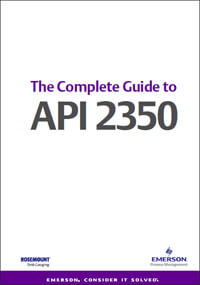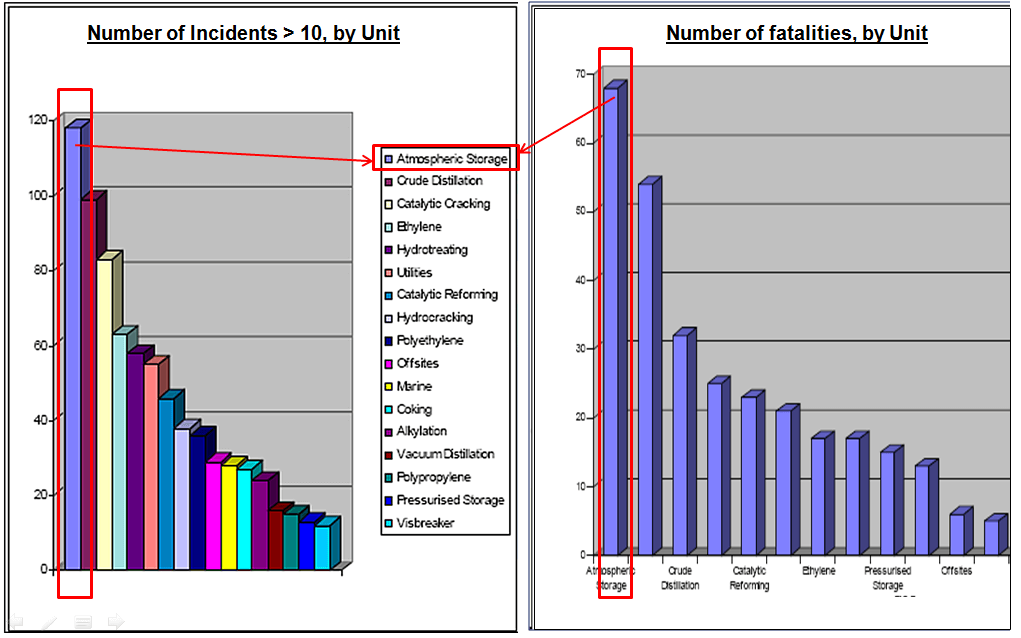One of Europe’s leading events for the tank terminal industry is StocExpo, going on this week in Antwerp, Belgium. The Emerson team is there showing tank gauging and terminal management solutions.
I had the opportunity to get my hands on a presentation being given today by Emerson’s Rikard Lövdahl who leads the Rosemount Tank Gauging business. Rikard’s presentation is titled, “There is no reward for risk takers when it comes to overfill prevention”.
He opens the presentation showing 20 years of data collected by industrial insurance broker, Marsh, that atmospheric storage tanks are the leading cause of fatalities and abnormal incidents at oil & gas facilities.
To address this situation, the American Petroleum Institute released edition 4 of its API 2350 – Overfill Protection for Storage Tanks in Petroleum Facilities in May of 2012. The standard provides a description of the minimum requirements to comply with overfill prevention best practices.
It is based on other important safety standards, including the global process safety standard, IEC 61511. We’ve highlighted this performance-base standard in numerous posts here on the blog. API 2350 is intended be equally valid & applicable globally. Its main purpose is to prevent overfills. Rikard notes that beyond safety, application of this standard can help to increase operational efficiency and provide increased tank utilization. API 2350 addresses management systems, risk assessment systems, operating parameters, procedures, equipment systems, and automated overfill protection systems (AOPS) based upon safety instrumented systems (SIS).
 The Rosemount Tank Gauging team worked with Phil Myers, the API 2350 Committee chairman, to develop a guide—The Complete Guide to API 2350. Phil has chaired numerous task groups for the American Petroleum Institute and currently, he is the director of PEMY Consulting. He has also worked at Chevron Corporation where he was a mechanical integrity specialist for tanks, piping and pressure vessels specializing in safety and risk.
The Rosemount Tank Gauging team worked with Phil Myers, the API 2350 Committee chairman, to develop a guide—The Complete Guide to API 2350. Phil has chaired numerous task groups for the American Petroleum Institute and currently, he is the director of PEMY Consulting. He has also worked at Chevron Corporation where he was a mechanical integrity specialist for tanks, piping and pressure vessels specializing in safety and risk.
The 39-page guide introduces the standard and reasons for it, motivations for robust overfill protection, implementation, operations, automated overfill protection systems, equipment solutions, a compliance checklist, and frequently asked questions. It can help take you from some awareness of the standard to a much deeper understanding of its importance and how to implement in your facility.
Rikard highlights the categories of overfill protection systems. Category I is local, manual operations using hand gauging or automatic tank gauge (ATG). Alarms are not transmittable back to the control system or annunciated. Manual intervention is required to prevent overfill conditions. Category II provides for local and/or remote operations. The tank level is read with a sensor or ATG with a signal transmitted back to the control system or annunciated locally. Category III adds independent high-high level alarms with overfill protection dependent on local or remote operators. Category IV adds the safety shutdown AOPS system, which is independent of basic systems in categories I, II, and III. Overfill prevention is an automatic action performed by the AOPS system.
He shares the requirements for the instrumentation and AOPS system, which you can find in the API 2350 guide. He closes the presentation on the subject of floating roofs, something we discussed in an earlier post, Avoiding Dangerous Conditions through Tank Floating Roof Level Monitoring.
I hope that if you weren’t able to catch Rikard’s presentation live, that this provided you some background and resources to improve your overfill prevention efforts.
| iTunes

